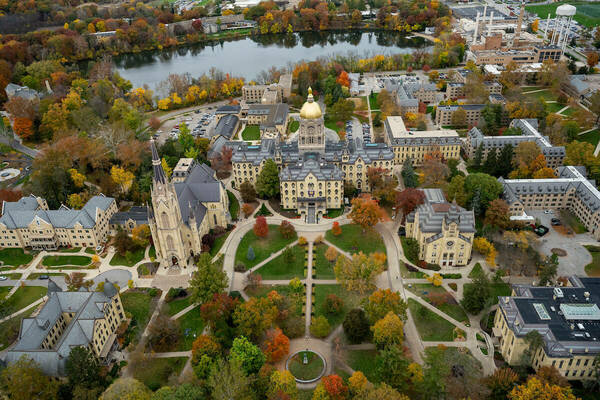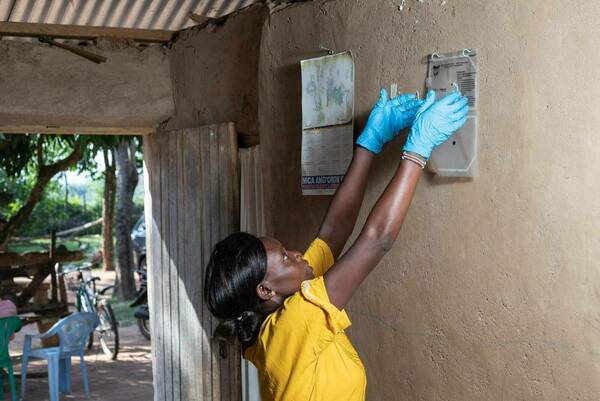Notre Dame faculty receive prestigious early career awards from the National Science Foundation
During the 2024-2025 academic year, four researchers in the University of Notre Dame’s Colleges of Engineering and Science received early career awards from the National Science Foundation (NSF).
The Faculty Early Career Development (CAREER) Program is one of the NSF’s most prestigious awards in support of junior faculty who exemplify the role of teacher-scholars through outstanding research, excellent education, and the integration of education and research in the context of their organization’s mission.
Jeffrey F. Rhoads, the John and Catherine Martin Family Vice President for Research and professor in the Department of Aerospace and Mechanical Engineering, said, “We congratulate these exceptional faculty members for the recognition that the CAREER award bestows upon their work, which is both inventive and ambitious. Notre Dame’s success with this program is a testament to both the groundbreaking research conducted here and the translation of this work into our classrooms and communities, investments in both current innovation and future talent for our nation.”
This year’s CAREER Award recipients are:

Fanxin Kong, assistant professor in the Department of Computer Science and Engineering
Kong will conduct a project titled “Security Foundations of Safe Learning Enabled Cyber-Physical Systems.” Kong will study new security vulnerabilities of learning-enabled cyber-physical systems and develop novel defense techniques to enhance real-world safety. Kong will evaluate the deployment of these techniques on multiple applications including autonomous vehicles and other robotic systems, with the goal of helping ensure the reliable operation of cyber-physical applications in the real world.
To promote student interest in cyber-physical systems, Kong and his team will integrate their research into educational programs at all levels, including summer learning opportunities with programmable robotic cars for K-12 students, as well as an annual robotics challenge and additional research programming for undergraduates at Notre Dame.

Xiaolong Liu, assistant professor in the Department of Physics and Astronomy
Liu’s project, “Atomic-scale Josephson Spectroscopic Imaging of Unconventional and Non-reciprocal Superconductivity,” will examine the directionality of electron flow in superconductors at the atomic level, with the objective of gaining insight into the very nature of superconductivity and its underlying mechanisms.
At the same time, Liu will broaden the educational impact of superconductor research through a STEM Teachers residency program, during which middle school teachers will participate directly in research and co-develop curriculum materials. Liu’s group will also design and construct demonstration setups for use in classrooms, research facilities, and museums.

Marc Osherson, assistant professor in the Department of Physics and Astronomy
Osheron will conduct a project titled “Probing low mass final states with the CMS detector,” targeting complex particle interactions predicted by theories that go beyond the current foundational theory of particle physics, called the Standard Model. At the Compact Muon Solenoid detector (CMS), one of the four main detectors at the CERN Large Hadron Collider (LHC), in Geneva, Switzerland, Osherson will develop advanced data analysis techniques, including re-imagining facial recognition tools to help interpret complex data produced by the CMS detector, with the goal of uncovering novel particles and interactions.
Simultaneously, Osherson will integrate his research into outreach programming tailored for high school students and teachers, including promoting greater participation in QuarkNet’s virtual particle physics workshops.

Nicholas Ramsey, assistant professor in the Department of Mathematics
Ramsey will conduct a project titled “Model theory, independence, and approximation.” Ramsey is specifically interested in smoothly approximable structures, which are infinite geometries that can be seen as 'limits' of finite geometric structures. Drawing inspiration from smoothly approximable structures, Ramsey will develop the necessary tools to understand and explore even more complex analogues of these geometries, which will enable meaningful applications to algebra, representation theory, and combinatorics.
Alongside his research, Ramsey will expand educational access to model theory by organizing a summer school for graduate students at Notre Dame, as well as collaborating with students in world regions where learning exposure to high-level mathematical logic is limited.
Since the program’s inception in 1995, 147 researchers at the University of Notre Dame have received NSF CAREER awards. To learn more, please visit the NSF's information page.
Contact
Erin Fennessy / Writing Program Manager
Notre Dame Research / University of Notre Dame
efenness@nd.edu / +1 574-631-8183
research.nd.edu / @UNDResearch / linkedin.com/company/undresearch
About Notre Dame Research
The University of Notre Dame is a private research and teaching university inspired by its Catholic mission. Located in South Bend, Indiana, its researchers are advancing human understanding through research, scholarship, education, and creative endeavor in order to be a repository for knowledge and a powerful means for doing good in the world. For more information, please visit NDR's website or NDR's LinkedIn.
Latest Research
- NSF Cyber SMART’s fall meeting shapes fifth year of project, legacy and future plans, and adds new memberThe U.S. National Science Foundation (NSF) Cyber SMART center gathered for its fall meeting on the University of Notre Dame campus this September. The meeting served as a checkpoint with progress reports and new projects from research leads and students…
- Slavic and Eurasian studies professor wins Humboldt fellowship to research how Russia’s religious past shapes its presentWhen Russia invaded Ukraine on Feb. 24, 2022, Sean Griffin realized his second book needed a new title. Griffin, an associate professor in the University of Notre Dame’s Department of…
- Notre Dame’s R.I.S.E. AI Conference builds interdisciplinary collaboration to inform human-centered artificial intelligenceAs artificial intelligence (AI) transforms nearly every sector of society — from healthcare and education to governance and global development — a critical question emerges: How can we conscientiously design and deploy these powerful technologies to positively impact society? This…
- University of Notre Dame joins the Global Coalition of Ukrainian StudiesThe University of Notre Dame has joined the Global Coalition of Ukrainian Studies after signing a Memorandum of Cooperation (MOC), formalized on September 24, 2025, at the Ukrainian Institute of America in New York City. Notre Dame joined four other American…
- The University of Notre Dame’s Mendoza College of Business and Industry Labs team up to inspire national security manufacturing competitiveness in the regionThe South Bend - Elkhart Region is full of manufacturing companies that are poised to grow, and Executive Master of Business Administration (EMBA) and Master of Business Administration (MBA) students at the University of Notre Dame are finding innovative ways to contribute to that growth. Earlier…
- Notre Dame research informs WHO conditional recommendation for spatial repellents in malaria vector controlThe World Health Organization (WHO) recently announced a “conditional recommendation” for spatial emanators, also known as “spatial repellents,” in the fight against malaria. This key determination was informed by spatial repellent studies that included the Advancing Evidence for the Global Implementation of Spatial Repellents (AEGIS) Project in Kenya, led by the University of Notre Dame and funded by Unitaid. The findings from this particular study were recently published in The Lancet.













